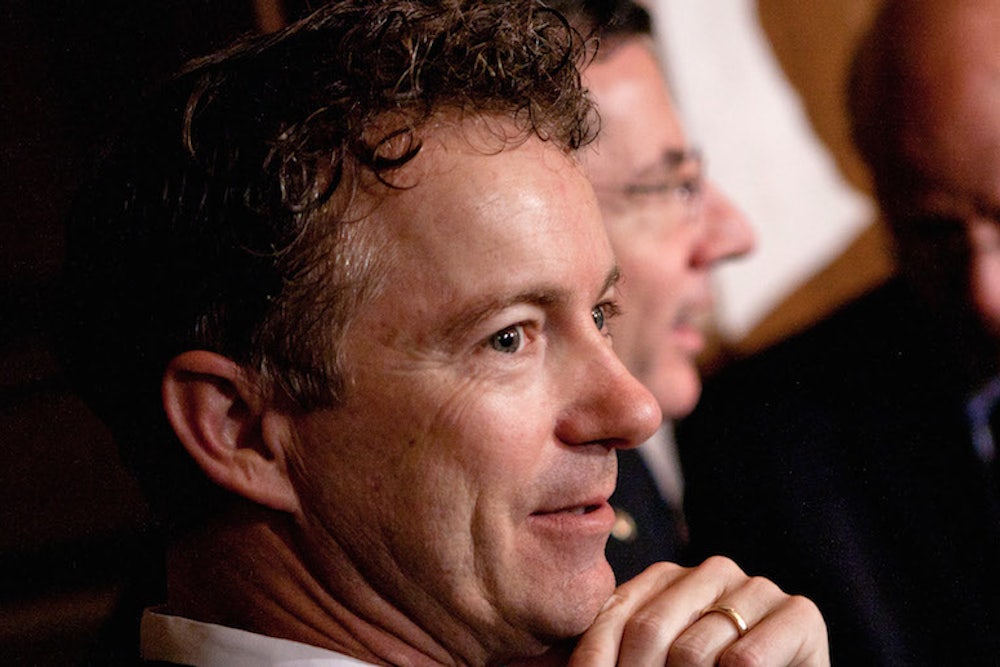Earlier this week, the Second Circuit Court of Appeals issued a stunning rebuke of presidential secrecy on the drone program. The three-judge panel ordered the Obama administration to give The New York Times, the plaintiff in the case, a copy of the Department of Justice’s legal memorandum outlining the constitutionality of a drone strike on Anwar al-Awlaki. Judge Jon Newman ruled that, "Whatever protection the legal analysis might once have had has been lost by virtue of public statements of public officials at the highest levels and official disclosure of the DOJ White Paper."
The case is yet another example of a strategic blunder the Obama administration continues to make: keeping secret its rationale for a number of national-security programs, namely targeted drone killings and National Security Agency surveillance. Doing so has made it impossible for the administration to defend its record, and has also caused the national conversation to focus on the secrecy of the programs rather than the programs themselves. Obama can only regain control of that conversation by showing greater transparency.
Until then, the field is controlled by a growing right-left coalition that seeks to portray the administration’s policies as running amok: In a speech after leaving the State Department, former Legal Adviser Harold Koh1 said that this coalition “from Code Pink to Rand Paul has now spoken out against the drone program, fostering a growing perception that the program is not lawful and necessary, but illegal, unnecessary and out of control.” Rand Paul’s popular filibuster against the targeted killing of Anwar al-Awlaki would have been unfathomable if the administration had come out and offered a full-throated description of how al-Awlaki had personally overseen the "underwear bomber" plot.
Even officials within the administration have begun to call for more robust disclosure about national security policies. Director of National Intelligence James Clapper regretted that he gave the “least untruthful” answer to Senator Ron Wyden’s question about NSA surveillance and said that the best course would have been to acknowledge the scope of the program: "Had we been transparent about it and say here’s one more thing we have to do as citizens for the common good, just like we have to go to airports two hours early and take our shoes off, all the other things we do for the common good, this is one more thing.” Koh, meanwhile, has called for a more robust disclosure about the scope of the drone program, saying the “persistent and counterproductive lack of transparency has led to the release of necessary pieces of its public legal defense too little and too late."
Historically, presidents have been willing to use their lawyers to offer public defenses of their national security policies. These defenses give the public an opportunity to engage with the presidents’ policies, and transparency breeds some level of public trust. In the lead-up to World War Two, Attorney General Robert Jackson laid out the legal framework for the administration’s decision to transfer a group of destroyers to the British. Though the decision was unpopular, the administration forcefully made the case for their action and its legality. Even in the midst of the unpopular Vietnam War, the Johnson administration deployed Undersecretary of State Nicholas Katzenbach to hearings at the Senate Foreign Relations Committee to offer a defense of the constitutionality of the war. While smoking a cigarette, Katzenbach answered questions from Senator J. William Fulbright about the legality of the war. Regardless of whether the public agreed with these views, the administrations were willing to publicly defend their national security policies.
Secrecy about a given policy suggests to the public that something needs to be hidden. Some critics, for instance, have compared Obama’s drone program to Nixon’s secret bombing of Cambodia simply because both campaigns were conducted in secret. Of course, the programs are nothing alike in their substance. The targeted killing of al-Awlaki had strong justifications, as compared to the indiscriminate bombing of Cambodia. However, that is a case that the administration needs to be making to the public.
Secrecy is also impossible to maintain in today's media environment. The executive branch “leaks like a sieve,” wrote Columbia law professor David Pozen. And when details about a program leak, the ensuing public outrage can endanger the program altogether. Rather than inspiring a public debate about surveillance after September 11, the Snowden leaks led to Congress nearly passing legislation, the Amash amendment, that would have wiped out any surveillance of U.S. citizens.
The administration can appeal this week’s Second Circuit decision, and the case may go to the Supreme Court, but Obama can track a new course on transparency. Rather than suffering another high-profile blow to its excessive secrecy, the administration should begin to more openly acknowledge and defend the steps it is taking to protect our nation’s security. It has begun to move in that direction: After a review, the administration loosened the disclosure rules on national security letters that require companies to hand over data about customers. And the decision to strengthen the Privacy and Civil Liberties Oversight Board, an independent agency that can inspect government programs and issue reports on their implications for privacy, is important.
But those aren't enough. It’s time for a new era of transparency. Otherwise, the public debate will continue to be dominated by Rand Paul and Code Pink's conspiracy theories.
Full disclosure: I was a student of Koh’s at Yale Law.
